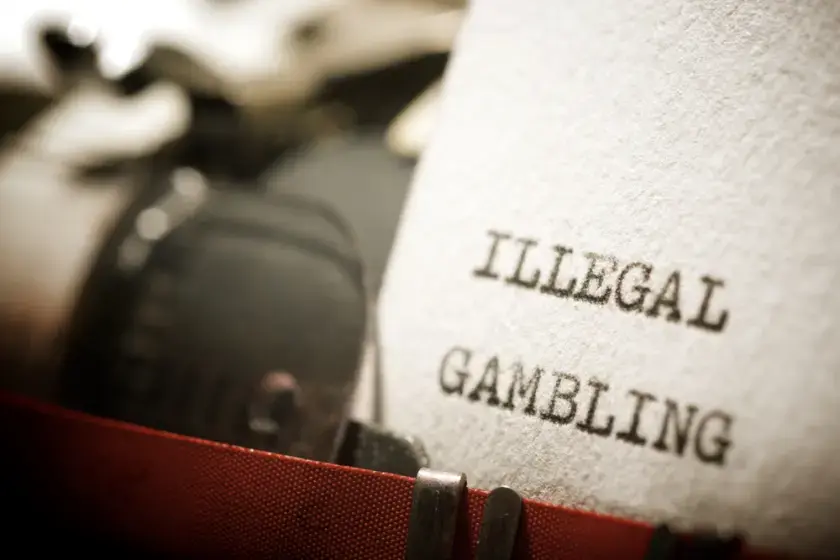Understanding Illegal Gambling: Categories, Risks, and Prevention Strategies

Title Image Credit: WINDCOLORS/Shutterstock
Key Takeaways on Illegal Gambling
- Defining Illegal Gambling: Learn what makes gambling unlawful and how it differs from licensed activities.
- Main Categories: Explore the widespread forms of illegal gambling, from unregulated sports betting to unauthorized online platforms.
- Legal Ramifications: Understand the penalties and risks faced by both participants and those running illicit operations.
- Societal and Economic Impacts: Examine how illegal gambling fuels criminal enterprises and affects local economies.
- Enforcement and Prevention: Review the latest tools and government efforts targeting illegal gambling worldwide.
Introduction: The Hidden Dangers of Illegal Gambling
Imagine a friend sharing a link to a high-stakes poker website where no identification is required and you can wager real money with just a few clicks. It feels tempting, but have you considered whether it’s legal-or what the risks are if it isn’t?
Illegal gambling sits at the crossroads of excitement and substantial threat. It isn’t limited to backroom card games or secretive local casinos; today, it extends to sophisticated online sites and covert operations that flourish outside the reach of laws and oversight. While the prospect of winning big may be alluring, the hazards range from financial loss and criminal charges to much broader consequences for society.
Defining Illegal Gambling: What Sets It Apart?
- Illegal gambling refers to any betting or wagering that violates local, state, or federal laws.
- This includes unlicensed brick-and-mortar venues, illicit gaming rings, and unauthorized online or mobile platforms.
- Legal status depends on jurisdiction-what’s banned in one country or state may be permitted in another.
At its core, illegal gambling is defined by the lack of proper approval or licensing from relevant authorities. Across most legal frameworks, gambling becomes illicit when three elements come together outside legal channels: (1) a wager (something of value is placed at risk), (2) a game of chance (outcome determined at least in part by luck), and (3) a prize (something of value to be won).
Globally, the extent of illegal gambling varies dramatically. As an example, the American Gaming Association estimates that over $150 billion is illegally wagered on sports across the United States annually-an amount vastly surpassing the legal sports betting market.
This enormous shadow economy underscores why understanding and addressing illegal gambling is a priority for regulators, law enforcement, and communities alike.
Major Categories of Illegal Gambling
Illegal gambling covers both informal wagers between individuals and large-scale operations run by criminal networks. Activities often fall into the following main categories:
- Private, unregulated bets between acquaintances
- Organized illegal gambling enterprises, sometimes linked with other crimes
- Unlicensed sportsbooks, casinos, and online gaming sites

Image Credit: Pla2na/Shutterstock
Unregulated Sports Wagering
Sports betting remains one of the largest sources of illegal gambling globally. Despite legalization efforts in some regions, the vast majority of bets are still placed through illicit channels. In the United States, it’s estimated that approximately 80% of sports wagers occur outside legal sportsbooks, with illegal operators generating around $150 billion annually.
Unlicensed bookmakers attract bettors with better odds, credit-based betting (wagering on borrowed money), and the promise of tax-free winnings. However, these advantages often come with increased risks-such as unprotected debt collection, unreliable payouts, and exposure to criminal prosecution.
Unauthorized Online Gambling
Digital technology has made it easier than ever to access illegal gambling platforms. Many unlicensed websites and apps are based in countries with weak enforcement and accept players from regions where online gambling is banned or heavily restricted.
The global online gambling market reached $61.5 billion in 2024, with estimates suggesting that unlicensed or illegal sites account for up to 30% of that figure. These platforms lure users with bigger bonuses, a sense of anonymity, and the convenience of worldwide access-but players often face poor consumer protections and a high risk of fraud.
In 2024 alone, U.S. authorities received over 2,400 complaints tied to online gambling scams, with an average reported loss of over $2,000 per incident.
Lottery and Sweepstakes Frauds
Some of the most damaging illegal gambling schemes come in the form of lottery or sweepstakes scams. These fraudulent operations masquerade as legitimate contests, targeting unsuspecting individuals-particularly seniors. In 2023, Americans lost more than $166 million to such scams, with those over 65 suffering the biggest financial impacts.
Because these scams are often run from overseas, recovering losses or prosecuting perpetrators is exceedingly difficult, exacerbating the harm to victims.

Image Credit: Pla2na/Shutterstock
Legal Risks of Involvement in Illegal Gambling
- Punishments can range from small fines to lengthy prison sentences, depending on one’s role and the scope of operations.
- Participants typically face lesser penalties, such as fines or misdemeanors; organizers risk severe felony charges, asset seizures, and tax investigations.
- Illegal gambling is also linked with prosecution for money laundering, racketeering, and related offenses.
The severity of legal consequences escalates depending on whether an individual merely participates or actually operates an illegal gambling business. Occasional bettors might be charged with misdemeanors-for example, first-time offenders in New York can be fined up to $1,000, while Nevada imposes fines as high as $10,000. Organizers, however, usually face felony charges that can lead to years in prison and the seizure of profits.
Large illegal gambling operations often attract the attention of federal authorities. The Illegal Gambling Business Act, for example, can bring up to five years in prison per count, with separate charges for ongoing or large-revenue activities. According to FBI reports, U.S. authorities seize roughly $1 billion in assets linked to illegal gambling each year.
Jurisdictional Differences and Federal Regulations
Whether a gambling-related act is prosecuted as a misdemeanor or felony depends on the specific laws of each state-and on federal statutes such as:
- Illegal Gambling Business Act of 1970
- The Unlawful Internet Gambling Enforcement Act (UIGEA) of 2006
- The Wire Act of 1961, designed to curb interstate and online betting
- Indian Gaming Regulatory Act (IGRA)
- Travel Act of 1961
Especially in states with thriving legal gambling industries-like Nevada and New Jersey-authorities often aggressively target illegal competitors to protect both consumers and state revenue streams. Nevada alone undertakes over 200 annual investigations connected to illicit gambling.

Image Credit: Rawpixel.com/Shutterstock
The Expanding Landscape of Online Illegal Gambling
- Modern technology and global connectivity make illegal gambling more difficult to detect and regulate.
- Digital currencies and VPNs help users bypass legal restrictions.
- Proliferation of app-based betting and dark web platforms challenges authorities.
The internet has transformed the illegal gambling market, with digital platforms enabling operators to reach international customers from jurisdictions with loose or unenforced regulations. These sites mimic their legal counterparts, offering sophisticated interfaces, customer service, and a range of payment methods, all designed to appear legitimate while evading oversight.
Gambling on the Dark Web
Many illegal gambling websites now reside on the dark web, accessible only with specialty browsers such as Tor. These platforms transact almost exclusively in cryptocurrency and operate with high levels of anonymity-making enforcement difficult. Even if authorities close one site, others appear quickly under new names.
The Surge of Illegal Gambling Apps
Betting applications, disguised as innocuous entertainment or hidden outside official app stores, have grown rapidly. Some mimic regulated betting apps but operate without any oversight, while others are designed for the underground market and use advanced techniques to evade detection, such as encrypted messaging and frequent changes of server location.
Many of these apps cultivate online communities, increasing engagement and normalizing illegal gambling. In 2024, the FBI identified over 3,200 such apps targeting U.S. residents-a 78% increase in just two years.

Image Credit: WINDCOLORS/Shutterstock
The Role of Cryptocurrency in Unregulated Gambling
Cryptocurrency has made illegal gambling even more challenging to monitor. Transactions through digital coins like Monero or Zcash can be nearly untraceable, allowing both players and operators to hide their identities.
- Illegal platforms accept crypto for deposits and withdrawals, circumventing traditional banking systems and related safeguards.
- “Mixers” and “tumblers” further obscure transaction trails, complicating investigations.
- Roughly 12% of all dark web cryptocurrency payments are linked to gambling operations, making it one of the top uses for illicit crypto activity worldwide.
This blend of privacy, speed, and international reach makes digital currencies the preferred payment method for many unlicensed gambling operators.

Image Credit: Rawpixel.com/Shutterstock
Managing and Curtailing Illegal Gambling Activity
- A multitiered approach-spanning detection, enforcement, and education-is necessary for effective prevention.
- Governments, tech platforms, and private organizations must work together.
- Legal frameworks must evolve continuously to keep pace with new technologies and tactics.
Updating and Strengthening Regulatory Frameworks
Governments worldwide are working to update their gambling laws to address modern realities, including the challenges posed by online platforms and cryptocurrencies. Most experts advocate for reforms that precisely define illegal gambling, set clear penalties, and support ongoing law enforcement efforts. In a recent survey, nearly three-quarters of Americans favored modernizing these laws to reflect today’s digital landscape.
Regulatory Sandboxes as Testing Grounds
Some jurisdictions, like the UK, now use regulatory “sandboxes” to trial new technologies and regulatory strategies in a controlled environment. This approach enables authorities to stay flexible, keeping consumer protection measures up-to-date and targeting new threats as they emerge.
Raising Public Awareness
A critical element in prevention is educating the public. Many individuals unknowingly break the law or fail to realize their participation can support criminal activities. Awareness campaigns stress the risks of illegal gambling, its link to organized crime, and the absence of consumer protections. These efforts have been shown to reduce both demand for unlicensed gaming and the incidence of problem gambling.
How Casino.Org Educates and Protects Consumers
Casino.Org plays a vital role in the fight against illegal gambling by providing readers with extensively researched guides, articles, and regularly updated reports. The platform informs consumers about safe gambling practices, helps identify red flags, and lists untrustworthy operators to avoid. By empowering users with knowledge and resources, Casino.Org contributes to a safer, more transparent gambling ecosystem.













